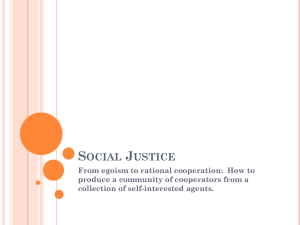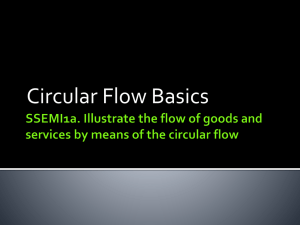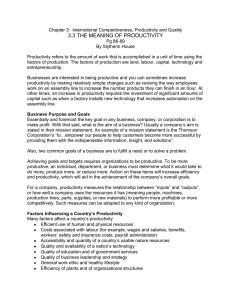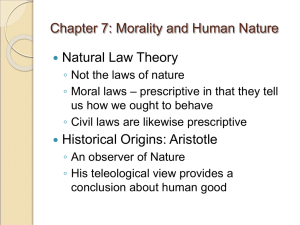Political Philosophy.pptx
advertisement
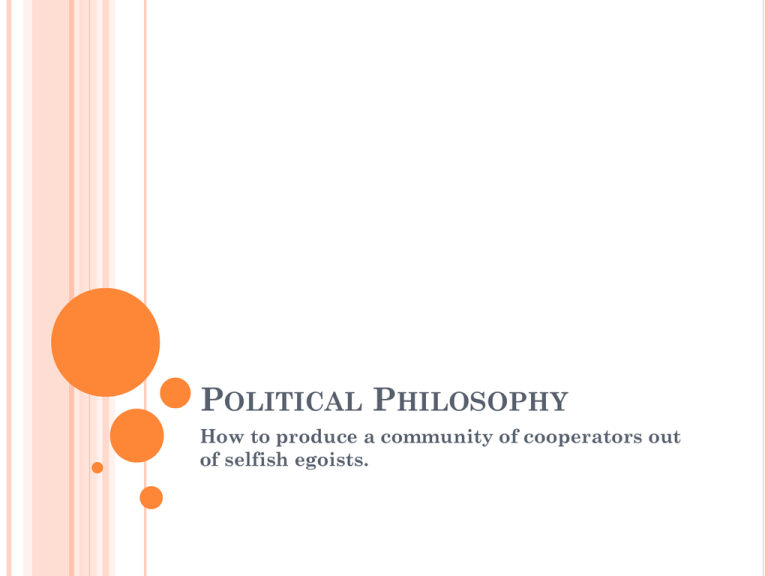
POLITICAL PHILOSOPHY How to produce a community of cooperators out of selfish egoists. THE PROBLEM OF SOCIAL COOPERATION For society to flourish, individual citizens must be willing to cooperate on projects that promote the general interest. Often, such cooperation requires a sacrifice in individual interests. This creates a temptation to live as a free-rider or parasite. If a rational agent is one who maximizes individual utility, how is it rational to promote the greater good at the expense of personal interest? PRISONER’S DILEMMA B Stays silent B Confesses A Stays silent 1,1 10,0 0,10 9,9 A Confesses SOLUTIONS TO THE PRISONER’S DILEMMA Political Solutions: Use of external constraints (threat of punishment) to change the payoff structure. If the penalty is sufficiently severe, it is no longer in the self interest of a rational agent to deviate from the cooperative strategy. Moral Solutions: Cultivate internal (moral) constraints to change the dispositions of the agents. The desire to promote the general interest is identified with each individual’s interests. MORAL MOTIVATION Self interest theories (Plato, Aristotle) Virtue is its own reward. Deontological theories: Each individual is motivated by a sense of duty to all social responsibilities that reason recognizes as universally required. Utilitarian theories: Each is motivated by an impartial desire to perform those actions that will promote the utility of everyone. THOMAS HOBBES (1588- 1679) The human condition: Subjective circumstances- humans are: acquisitive, they desire to accumulate without limit; competitive, vying for limited quantities of goods; vainglorious, they enjoy dominating others; diffident, fearful of others; anxious, worry about their prospects. STATE OF NATURE Objective circumstances: relative equality of strength and ability (produces mutual vulnerability); relative scarcity of goods (creates competition for limited resources). The state of nature- a hypothetical situation where we imagine human beings living without any sort of government. Given the subjective and objective conditions of human life, our natural condition in the state of nature is a state of war. THE WAR OF ALL AGAINST ALL In the state of nature, the life of human beings is solitary, poor, nasty, brutish, and short. Morality and justice do not exist. Cooperation for mutual benefit is impossible A powerful sovereign is required to enforce covenants. The threat of punishment, an external constraint to ensure that covenants are upheld. Valid covenants exist when each citizen submits his private will to the sovereign will. JEAN-JACQUES ROUSSEAU (1712-1778) Man is born free and everywhere he is in chains. External constraints are a kind of tyranny since might does not make right. Internal constraints, whose value can be confirmed by any rational citizen, reduce the need for government to a minimum. THE SOCIAL CONTRACT A citizen’s rights are not natural, but created by a social convention (or contract). Since no man has a natural authority over his fellow man, and since force does not give rise to any right, conventions remain the basis of all legitimate authority among men. The transition from the state of nature to the civil state: substitutes justice for instinct; duty replaces inclination; right replaces appetite. TRADING NATURAL LIBERTY FOR MORAL LIBERTY His faculties are developed, his ideas are broadened, his feeling ennobled, his entire soul is elevated…he ought to bless the moment that transformed him from a stupid, limited animal to an intelligent being and a man. To participate in the social contract, we give up our natural liberty to gain civil and moral liberty. To be driven by appetite is slavery, and obedience to a law one has prescribed for oneself is liberty. However unequal in force or intelligence they may be, men all become equal by convention and by right. KARL MARX (1818-1883) Historical materialism: historical change is due not to the choices of humans, but to the evolution of technology. As productive forces (technological innovations for transforming nature into useful products) develop, the structure of society changes. HISTORICAL MATERIALISM When the old structure begins to impede (fetter) the development of technology, it is replaced by a new structure, that enhances the growth of the productive forces. This is why feudalism was replaced by capitalism. As capitalism continues to “fetter” the development of the productive forces, it will give way to communism. The societal changes are the result of class struggle. ORTHODOX MARXISM Compatibility thesis: a given economic system is compatible with only a certain level of development of productive forces. Development thesis: productive forces tend to develop. Contradiction thesis: the development of these forces generates a ‘structural instability’ between productive forces and productive relations. Transformation thesis: productive relations (of control over the forces and other persons) are transformed to become compatible with the productive forces. Optimality thesis: the productive relations that result are those that are optimal for the ongoing development of the productive forces. ALIENATION AND CLASS STRUGGLE Workers (the proletariat) are alienated (from themselves and their work) in a capitalist system. The worker is a commodity, a means to the end of increasing the wealth of the capitalist owners. The work is external to the worker, it is not a part of his nature, consequently, he does not fulfill himself in his work…does not develop his physical and mental energies…. It is not his own work, but work for someone else. Labor should be an expression of the workers essential humanity. Consciousness of exploitation causes the proletariat class to revolt. JOHN RAWLS (1921- 2002) A Theory of Justice, 1971. What I have attempted to do is to generalize and carry to a higher order of abstraction the traditional theory of the social contract as represented by Locke, Rousseau, and Kant. JUSTICE AS FAIRNESS To discover the basic principles of justice, (according to which benefits- rights, goods- and burdens- obligations- are distributed) consider the principles that would be chosen by an assembly of free, rational, mutually disinterested agents (concerned to promote their individual interests) behind a veil of ignorance. The veil of ignorance prevents a person from knowing his social status, class, gender, talents, life-goals, etc. THE ORIGINAL POSITION In the original position (behind the veil of ignorance) an assembly would select the following principles: (1) Principle of liberty: Each person has an equal right to the most extensive liberty compatible with a like liberty of all. (2) Principle of difference: Inequalities are arbitrary unless it is reasonable to expect that they will work out for everyone’s advantage and unless the offices to which they attach… are open to all. Autonomy, selfrealization.
